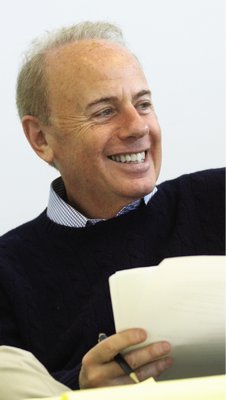
The eponymous hero of Roger Rosenblatt’s newest novel, “Thomas Murphy,” (Ecco, $24.99, 224 pp.) could easily give in to despair.
His wife of 50 years, Oona, has just died. He’s afraid that he’s slipping into dementia. He’s facing the possibility of eviction from his large, rent-controlled apartment. His daughter, Máire, is leaving with her son—his grandson and the joy of his life—for England and a higher paying job. Greenberg, his best friend, has been killed by a domestic partner. Yet Mr. Rosenblatt has created a character who is boundlessly resilient.
Mr. Rosenblatt is the distinguished professor of English and writing at Stony Brook University. He was an essayist for Time and “The News Hour” on PBS, where his work won two George Polk Awards, a Peabody and an Emmy. He is the author of, among other works, the novel “Lapham Rising,” two classics in the literature of grief, “Making Toast” and “Kayak Morning,” written after the death of his daughter, and the memoir “The Boy Detective.” There was also last year’s inimitable, unforgettable “The Book of Love,” a celebration of that emotion as explored in popular song.
Thomas Murphy, or Murph, as everyone calls him, is a poet, born and raised on the island of Inishmaan, one of the three major Aran Islands in Galway Bay. The Irish playwright John Millington Synge spent summers there for several years.
But in his early 20s, Murph leaves the constricting confines of Inishmaan for a fuller life on another island, Manhattan. It is in New York that Murph made his mark as a poet, teacher, and literary man. But Murph is now in his 70s and behaving in ways that alarm his daughter. He leaves his apartment door wide open at night. He boils some eggs and forgets about them until he sets the kitchen on fire. And he has the unfortunate habit when he is in his cups (Jameson’s) of singing “What Are You Doing For the Rest Of Your Life?” in his skivvies at 2 o’clock in the morning in his building’s courtyard. One evening he decides to take his neighbor Botsford’s blue Vespa for a spin around that same courtyard.
He does think about his “incredible shrinking brain,” but he doesn’t want to do anything about it. He could take a test, but he declines. “If the test shows that I’m not going to get Alzheimer’s, I’ll dance a jig, of course. But if it shows I have that little e-4 sucker, I’ll dance a jig, too, though I might forget I did it.” (E-4 is an Alzheimer’s indicator.)
In a side plot, Murph is approached as he sits in his favorite bar, named after the novel by Flann O’Brien, “At Swim-Two-Birds.” A man named Jack recognizes him as a poet whose picture he saw in the newspapers. He tells Murph that he has only a few months to live and doesn’t have the words to tell his wife, Sarah. Would Murph tell her instead? Murph might have had a bit too much Jameson’s when he agreed to be this reverse Cyrano. The man’s wife, by the way, is blind, but an admirer of Murph’s work. A friendship develops between Murph and Sarah. Will it blossom into love?
I leave the resolution of Murph’s many dilemmas for the reader to discover.
One of the difficulties that are inherent in writing convincingly about a poet is to make his occupation believable—if the author is not himself or herself a poet. Dr. Zhivago is believable because Boris Pasternak was himself a great Russian poet. Adam Dalgliesh was not believable as a poet because P. D. James was not one.
But Mr. Rosenblatt gets around this slightly by reproducing a few poetic rough drafts. He is also no stranger to exploiting the beauty of language. “Thomas Murphy” is told in the first person. His discourse is laced with allusions, epiphanies and linguistic buffoonery. The language is vivid, almost leaping from the page. Like this for example, addressing his dead wife: “What I miss most. Oona, it’s curious, I know, is the first time we met. Here’s why. Because if I could have that moment back, I could savor you rather than savor me savoring you. You have no idea how lovely you looked that day, like a gesture linking intelligence, sex, and grace, all bundled in you. A look capable of understanding and forgiveness on the large scale—not forgiveness for this transgression and that, but rather for the whole race, as if you were embracing all human ecstasy and error in your smiling eyes.”
As the Irish might say, this is a grand book, and Thomas Murphy is a delightful character.